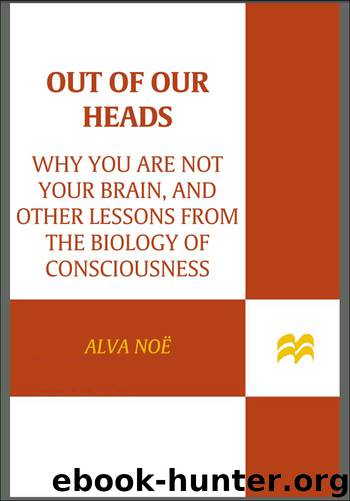Out of Our Heads by Alva Noë

Author:Alva Noë
Language: eng
Format: epub
ISBN: 9780809016488
Publisher: Farrar, Straus and Giroux
The Language of Thought
The same points can be made about language. The standard approach to language in contemporary “scientific” linguistics would have it that our basic competence, when we are competent speakers of a “natural” language, is in knowing rules for combining words into grammatically well-formed strings; our basic competence as listeners is in assigning meanings to sentences spoken by others on the basis of an understanding of the meanings of the individual words they use and the rules governing their combination. Language use, it is widely supposed, depends on our ability, or rather, the ability of our brains, to analyze, break down, and decode strings of sentences quickly and reliably.
This sort of approach to language rests on a systematic neglect of the actual phenomenon of language in very much the way that the computational approach to chess ignores the actual character of playing chess. Consider that most of what we say and hear we’ve said and heard before. Conversation rarely leads us out into the untamed wilds; most of the time we are on the school playground or following the paved walkways around the pond or the well-worn dirt paths to the benches. Our linguistic worlds—like the rest of our worlds—run along trails made through repeated walking. And as with walking, it is hard to step off the trail; like water rushing to the lowest point, linguistic thought follows a path to a lowest basin, a course of attraction that we can barely resist. What conversations have you had today? With your spouse, or your kids, or the man who sells newspapers on the corner, or the receptionist out front when you were collecting your mail, or your son’s nursery school teacher? The vast majority of what we say and hear is what we say and hear every day of our lives.
This is not a cause for alarm. One of the very many false ideas about language is that its primary function is to express information or communicate thoughts. Speech has many functions, but surely a large part of it is more like the grooming behavior of chimpanzees or the shepherding behavior of dogs than it is like reasoned discourse among parliamentarians. We bark so that our kids get out the door in time to get on their bus and so that they feel safe and loved; we purr so that our colleagues and coworkers know we’re on the job and ready to be called on. The bulk of what we say and do each day is more like the grunts and signals baseball players use to indicate who’ll catch the pop fly than it is like a genuine conversation.
Linguists tend to be impressed by what Noam Chomsky has called our linguistic creativity—our ability, that is, to understand and produce a potential infinity of sentences we have never heard before. Our knowledge encompasses the infinity of well-formed sentences, sentences of no fixed length formed by combining a finite number of words in accordance with a finite number of rules.
Download
This site does not store any files on its server. We only index and link to content provided by other sites. Please contact the content providers to delete copyright contents if any and email us, we'll remove relevant links or contents immediately.
When Breath Becomes Air by Paul Kalanithi(7264)
Why We Sleep: Unlocking the Power of Sleep and Dreams by Matthew Walker(5641)
Paper Towns by Green John(4169)
The Immortal Life of Henrietta Lacks by Rebecca Skloot(3826)
The Sports Rules Book by Human Kinetics(3588)
Dynamic Alignment Through Imagery by Eric Franklin(3489)
ACSM's Complete Guide to Fitness & Health by ACSM(3468)
Kaplan MCAT Organic Chemistry Review: Created for MCAT 2015 (Kaplan Test Prep) by Kaplan(3423)
Introduction to Kinesiology by Shirl J. Hoffman(3300)
Livewired by David Eagleman(3122)
The River of Consciousness by Oliver Sacks(2992)
Alchemy and Alchemists by C. J. S. Thompson(2911)
The Death of the Heart by Elizabeth Bowen(2901)
Descartes' Error by Antonio Damasio(2731)
Bad Pharma by Ben Goldacre(2730)
Kaplan MCAT Behavioral Sciences Review: Created for MCAT 2015 (Kaplan Test Prep) by Kaplan(2492)
The Gene: An Intimate History by Siddhartha Mukherjee(2491)
The Fate of Rome: Climate, Disease, and the End of an Empire (The Princeton History of the Ancient World) by Kyle Harper(2436)
The Emperor of All Maladies: A Biography of Cancer by Siddhartha Mukherjee(2431)
